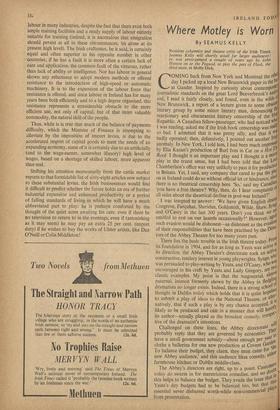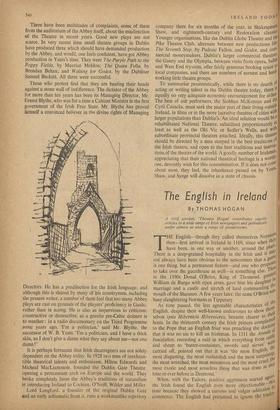Where Motley is Worn
By SEAMUS KELLY Resident columnist and theatre critic of the Irish Times, Seamus Kelly will shortly assail far larger audiences: he was press-ganged a couple of years ago by John Huston on to the Pequod, to play the part of Flask, the third mate, in Moby Dick. • COMING back from New York and Montreal the other day I picked up a local New Brunswick paper in the bar at Gander. Inspired by curiosity about contemporary journalistic standards on the great Lord Beaverbrook's nativ di sod, I read it fairly closely, and found, even in the wilds , New Brunswick, a report of a lecture given to some obsee'; literary group by some minor literary man, denouncing llil reactionary and obscurantist literary censorship of the 1r15 vil, Republic. A Canadian fellow-passenger, who had noticed „, I was reading, asked me if the Irish book censorship was res'% so bad. I admitted that it was pretty silly, and that it W', badly operated; then, defensively, I pointed out another Irish anomaly. In New York, I told him, I had been much imPret? by Elia Kazan's production of Burl Ives in Cat on a flat -11,, Roof. I thought it an important play and I thought it a Iner; play in the truest sense, but I had been told that the L? 0 Chamberlain's office was very unlikely to pass it for produeli'°, in Britain. Yet, I said, any company that cared to put the !jail; on in Ireland could do so without official let or hindrance, sn there is no theatrical censorship here. 'So,' said my Canadian' you have a free theatre? Why, then, do I hear complaints e'', all sides about the theatrical decline in post-war Ireland?' 4 I was tempted to answer : 'We have given English dran' Congreve, Farquhar. Sheridan, Goldsmith, Wilde, Shaw, Synge and O'Casey in the last 300 years. Don't you think we 3 entitled to rest on our laurels occasionally?' However, ag30 „.1 such evasion would be dishonest—as dishonest as the evasie" of their responsibilities that have been practised by the Dille' tors of the Abbey Theatre for too many years past. vroao There lies the basic trouble in the Irish theatre today. Fro tts foundation in 1904, and for as long as Yeats was active; its direction, the Abbey Theatre's directorate took an aCti*iii .v constructive, tutelary interest in young playwrights. Synge. ',',Jai was persuaded to play-writing by Yeats, and O'Casey, who '0 encouraged in his craft by Yeats and Lady Gregory. are, 'flst classic examples. My point is that the magisterial, alllivy paternal, interest fdrmerly shown by the Abbey in deciglini f
0
dramatists no longer exists. Indeed, there is a strong sane thought in Dublin today which holds that it is quite hoPei,J ss lte, to submit a play of ideas to the National Theatre, or 3er!: is natively, that if such a play is by any chance accepted, l'N likely to be produced and cast in a manner that will herr t- its author—usually played as the broadest comedy, irresP4 tive of the dramatist's intentions. will Challenged on these lines, the Abbey directorate ,,.ev probably reply that they are governed by economics. Pito' have a small government subsidy—about enough per Yea,irep, clothe a ballerina for one new production at Covent Garube To balance their budget, they claim, they must cater for her new Abbey audience,' and this audience likes comedy. either farmhouse kitchen or Dublin middle-class. niers The Abbey's directors are right, up to a point. Custo obt today do swarm in for meretricious comedies, and no d°, ill this helps to balance the budget. They evade the issue that is that .1; Yeats's day budgets had to be balanced too, but essential never disbarred worth-while non-commercial Pin from presentation. There have been multitudes of complaints, some, of them from the auditorium of the Abbey itself, about the misdirection of the Theatre in recent years. Good new plays are not scarce. In very recent time small theatre groups in Dublin have produced three which should have demanded production by the Abbey, and would, one feels confident, have got Abbey production in Yeats's time. They were The Purple Path to the Poppy Fields, by Maurice Meldon; The Quare Fella, by Brendan Behan; and Waiting for Godot, by the Dubliner Samuel Beckett. All three were successful.
Those who protest find that they are beating their heads against a stone wall of indifference. The dictator of the Abbey for more than ten years has been its Managing Director, Mr. Ernest Blythe, who was for a time a Cabinet Minister in the first government of the Irish Free State. Mr. Blythe has proved himself a convinced believer in the divine rights of Managing Directors. He has a predilection for the Irish language; and although this is shared by many of his countrymen, including the present writer, a number of them feel that too many Abbey plays are cast on grounds of the players' proficiency in Gaelic. rather than in acting. He is also as impervious to criticism, constructive or destructive, as a granite pre-Celtic dolmen is to weather : in a radio documentary on the Third Programme some years ago, `I'm a politician,' said Mr. Blythe. the successor of W. B. Yeats. 'I'm a politician, and I have a thick skin, so I don't give a damn what they say about me—not one damn !'
It is perhaps fortunate that Irish theatregoers are not solely dependent on the Abbey today. In 1928 two men of inexhaus- tible theatrical talents and enthusiasm. Hilton Edwards and Micheal MacLiammoir, founded the Dublin Gate Theatre. opening a prosceniurri arch on Europe and the world. They broke completely from the Abbey's traditions of naturalism in introducing Ireland to Cocteau, O'Neill, Wilder and Miller Lord Longford. a founder of the original Dublin Gate and an early schismatic from it, runs a workmanlike repertory company there for six months of the year, in Shakespeare, Shaw, and eighteenth-century and Restoration classics. Younger organisations, like the Dublin Globe Theatre and the Pike Theatre Club, alternate between new productions like The Seventh Step, by Padraic Fallon, and Godot, and corn' mercial moneymakers. Dublin's larger commercial theatres' the Gaiety and the Olympia, between visits from opera, ballet and West End try-outs, offer fairly generous booking space 10 local companies, and there are numbers of earnest and hard. working little theatre groups. To summarise pessimistically, while there is no dearth 01 acting or writing talent in the Dublin theatre today, there i5 equally no very adequate economic encouragement for either The best of our performers, the Siobhan McKennas and the Cyril Cusacks, must seek the major part of their living outside Ireland, in films or in the more lucrative theatres of cities With larger populations than Dublin's. An ideal solution would be 3 rehabilitated National Theatre, subsidised proportionately at least as well as the Old Vic or Sadler's Wells, and with subordinate provincial theatres attached. Ideally, this theatre, should be directed by a man steeped in the best traditions 0' the Irish theatre, and open to the best traditions and innova- tions of the theatre of the world. A goodly number of Irishmen' appreciating that their national theatrical heritage is a worth' one, devoutly wish for this consummation. If it, does not collie about soon, they feel, the inheritance passed on by Vats' Shaw, and Synge will dissolve in a state of chassis.



















































 Previous page
Previous page